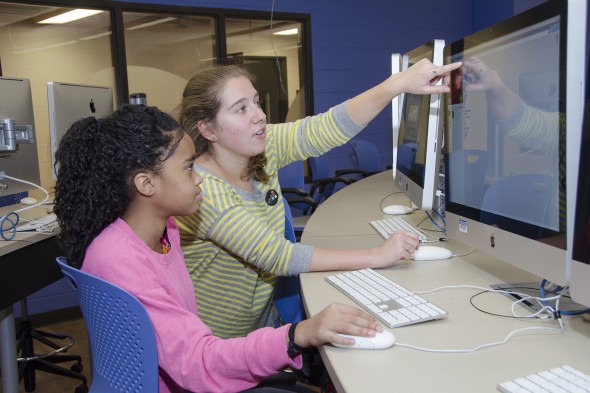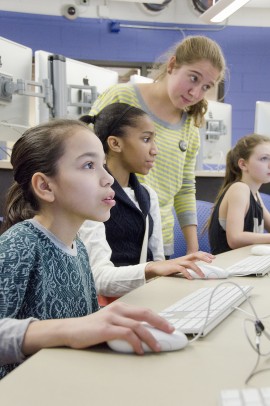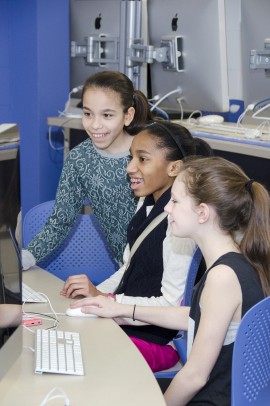Girls Who Code program fun into computer science

Instructor Sonia Golemme, a developer for GE Capital, helps Girls Who Code member Coda Lewis. “I feel very passionate about technology education, especially for women,” says Golemme. Photo: Joshua Clark
Twelve girls sit in a classroom in the Science and Engineering Laboratories Building on a Saturday morning. As part of a group activity, they’ve been told to come up with a category and list items from A to Z.
One of the groups decides to focus on food. They put down “xtra-cheesy mac and cheese” for the letter X. What does this have to do with computer science? The letters for the category are like the variables in a code, one of the advisers explains. The girls nod their heads in understanding.
This is Girls Who Code, a nationwide organization with clubs at different institutions. The organization’s goal is to provide computer science education and exposure to 1 million girls by 2020.
This is the first year UIC’s Women in Science and Engineering program has sponsored a chapter. Girls between the ages of 12 and 18 meet once a week — Saturdays from 10 a.m. to noon — to learn about coding and create their own programs. The organization runs on a three-level system. After completing all three, girls have completed the equivalent of a college course.

Sonia Golemme instructs Girls Who Code members Sofia Rivera and Havelin Williams. Photo: Joshua Clark
The importance of teaching young girls about coding lies in the statistics. Women represented 37 percent of computer science graduates in 1984. Today, that number has dropped to 12 percent.
“The reason for that drop is because a lot of girls think that computer science is a boys’ club environment,” said Edyta Dudek, community outreach director for Women in Science and Engineering and an adviser for Girls Who Code. “Our girls are very comfortable with the program. It’s their environment, and not a boys’ club.”
On this particular Saturday, the girls finish up an online version of Mad Libs, where they program characters to respond to questions. They’re later taught to create a modified game of blackjack that plays against the computer.
“I’m astonished that they’re even learning how to code,” said Lauren Kobus, a senior in biological sciences with a minor in chemistry. “It’s really good to see to see girls this young interested in something like this.”
Kobus is one of the two student ambassadors for Girls Who Code. An industry professional also participates: in this case, it’s Sonia Golemme, an application developer for GE Capital.
“I feel very passionate about technology education, especially for women,” said Golemme. “I think when we bring in diverse perspectives, you’re always going to get better ideas,” she said. “If you do have an environment that’s 90 percent one gender, you’re going to limit the number of ideas you’re going to get.”
The girls have a good time. There are giggles and smiles between the icebreakers, coding and lectures.
“It’s a good way to spend my Saturdays when I don’t have friends sleeping over,” said Hannah Rinchich, 13, of Lemont, a student at Old Quarry Middle School. “I’m enjoying learning something that I really, really want to learn.”
Rinchich wants to make games “so that everyone can have the same enjoyment I did,” she said. “It would also be fun to write a story plot for a game that would toy with the player’s emotions.”
Trinity McKinney, 15, of Hyde Park, plans to combine science and art. “I want to major in dance and minor in computer science, so I want to bring them together as one,” said McKinney, a student at Latham High School.
How? By engineering costumes that play with light and go along with the dance movements, she explained.
Elenna Claudio, 12, of Logan Square, likes Girls Who Code because it’s a new challenge. “We do coding in school, but we never really get into coding — we only do it for a week,” said Claudio, a student at Burley Elementary School. “I think coding here is really fun. I probably want to code when I grow up, because it’s really fun and a good way to spend my time.”
Girls Who Code started at UIC last fall and runs year-round until May 16. The club selected 20 girls from 60 applicants.
“Which goes against the popular notion that girls aren’t interested in computer science, coding, or wouldn’t come,” said Veronica Arreola, director of the Women in Science and Engineering program.
Arreola and Dudek are looking for funds to expand Girls Who Code.
“We’ve had such a great response, not just at the application stage, but with our community partners who want us to do this for them, and the girls wanting to do their birthday parties at meetings,” Arreola said.

